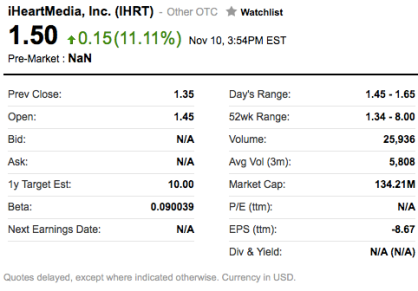by Darryl Parks • November 11, 2015 on darylparks.com
It’s been almost 20 years ago since the Federal Communications Commission (F.C.C.), the National Association of Broadcasters (N.A.B.), Congress and then President Bill Clinton all teamed up to reinvent broadcasting with the historic Telecommunications Act of 1996, the first major rewrite of regulations since the 1930’s.
With this combined brain power and political and business clout, what could possibly go wrong? Many assumed the President along with these groups would have the public’s “interest, convenience and necessity” in mind when crafting these new rules. And you know what happens when you assume.
Struggling broadcasters could now survive because of clustered ownership, allowing multiple stations in each market, and benefiting from economies of scale. We were told broadcasters granted the privilege and given licenses, along with the public’s trust, would create new and diverse programming options for listeners. A fragmented radio industry, mostly made up of mom-and-pop stations back then, would consolidate and once the big money of Wall Street discovered this high cash flow business, there would be incredible innovation. Best of all, radio because of its newly aggregated audiences, would be able to leverage and grow its share of the total advertising pie. Industry professionals, from CEO’s down to the overnight weekend DJ’s in Kokomo, Indiana, could now dream and it would be reality.
Really, what could go wrong?
Back in the 90’s, I commented, “I never thought radio would come down to 6 or 8 big radio companies.” The person I said this to responded, “Darryl, do the math. It will be 2 or 3 companies. Companies have just been trading stock. Wait until the real money comes in.” He meant Wall Street’s real money.

That real money did come in and now the two biggest radio companies, Cumulus and iHeart Media, are in big time trouble. And if they’re in trouble, so is the entire radio industry.
I’m going to make this overly simplistic. Remember financial data doesn’t exist in a vacuum. There are many variables.
I brought data to an economist/professor I know and his first reaction when checking it out on his Bloomberg terminal was a surprised, “Oh. They’re bankrupt.”
On November 10, 2015 Cumulus Media’s stock price was valued in pennies, as in “27 pennies” per share. iHeart Media’s stock was $1.50 a share that same day.
In financial circles, a company’s worth may be judged by its “market capitalization” and/or its “enterprise value.”

Let’s look at the “market cap” first.
- Cumulus Media with a stock price of 27 cents a share had a market cap of $63,460,000 meaning each of its 454 radio stations are worth about $139,779 a piece.

- iHeart Media with a stock price of $1.50 a share had a market cap of $134,210,000, meaning each of its approximately 850 radio stations are worth approximately $157,894 a piece.

Of course, each company has other businesses and divisions, but their core business remains radio.

Too simplistic for you? The other way to look at a company’s worth is by its “enterprise value.”
On November 10, 2015, Cumulus Media had an “enterprise value” of $2.468 billion, while iHeart Media had an “enterprise value” of $20.54 billion.
I know. You’re saying, “Well there’s the worth of these companies.” Kind of, since the buyer of a company would normally assume its debt, but if you take debt out of this equation, in both cases, these companies have negative equity. iHeart Media lists it debt at $20.588 billion and Cumulus Media has outstanding debt around $2.5 billion.

In 2014, the radio industry’s total spot revenues declined to under $14 billion, with total revenues just over $17 billion. iHeart Media alone is in hock by almost $20.6 billion. But, here’s the killer, each year the money companies pay to service debt is increasing at the same time radio’s advertising revenues shrink and that’s not sustainable.

Think about the interest you’re getting from a CD at a bank. It’s probably less than 1%. Interest rates are at historic lows, yet iHeart Media is paying, in one case, as much as 14% on its notes. When borrowing money, high risk equals high cost.
Both iHeart Media and Cumulus have also been selling tower sites (or land) to create cash. Land was the only equity some radio stations had, especially many AM stations. Call it what you want, but when a radio company starts selling its real estate, it’s nothing but a good old fashioned fire sale.
Back to that fellow I discussed radio consolidation with in the 90’s. I recently asked him why these companies haven’t been selling stations. His response, “They can’t. To make it work financially they’ll need to get at least 14 times cash flow, may be 16 times, depending on taxes and the cost of sale. They’re backed into a corner.”
Wanna buy a radio station really cheap in the future?
To paraphrase that old New York City TV pitchman Crazy Eddie, “The prices are INSANE!”











